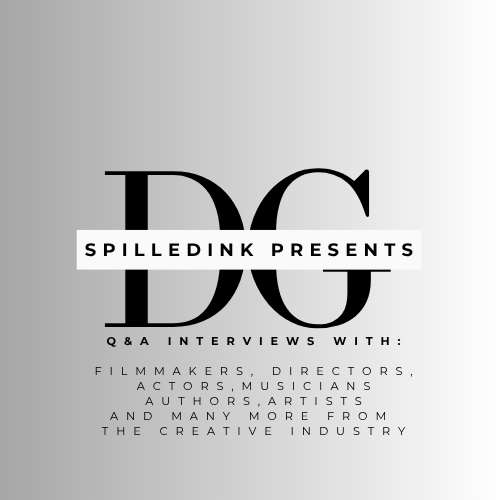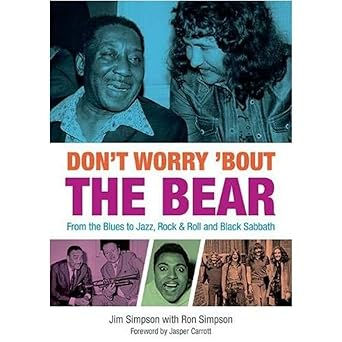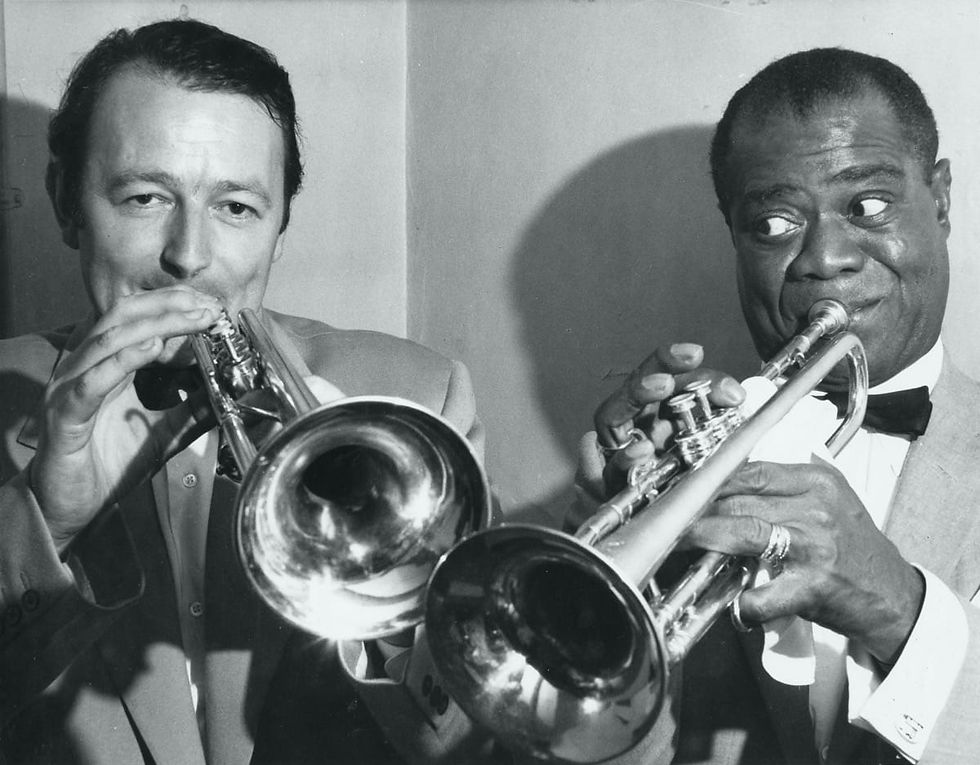SPOTLIGHT: JIM 'BIG BEAR' SIMPSON
- D.G. Torrens

- Sep 16, 2025
- 7 min read

FOUNDER
BIG BEAR
RECORDS
DIRECTOR
BIRMINGHAM
JAZZ FESTIVAL
BIO:

JIM SIMPSON, 87: A Lifelong Champion of Music and Birmingham stands as a towering figure in British music. He founded Big Bear Records in 1968.
The name was inspired by his nickname from legendary Radio One DJ John peel. Jim helped shaped the sound of heavy metal before turning his focus to Jazz and blues. Jim was the first band manager of Black Sabbath and played a huge role in their early success. Beyond music, Jim is also a published author, adding literary flair to his already rich legacy. Jim’s contribution to the world of music has made him an icon of Birmingham’s creative spirit. In 2024, Jim received an honorary doctorate in music by the University of Birmingham, the eve of Jim’s 4oth annual Birmingham Jazz and Blues Festival. Later that year in November 2024 Jim was awarded the lifetime achievement award, acknowledging his decades-long influence in the music industry.
SUMMARY
Jim Simpson: The First Band Manager of Earth (later Black Sabbath)

Jim played a pivotal role in rock history as the original manager of Earth, the band famously renamed Black Sabbath under his management. Under his guidance, the band soared to the top of the album charts with Paranoid, cementing their place in music history.
Champion of American Blues: After parting ways with Black Sabbath, Jim turned his attention to the rich sounds of American blues. Through his label, Big Bear Records, he launched the American Blues Legends Tours, bringing iconic artists like Tommy Tucker, Willie Mabon, Homesick James, Doctor Ross, Snooky Pryor, Cousin Joe, Eddie Guitar Burns, Champion Jack Dupree, and Eddie Playboy Taylor to UK audiences. Big Bear released 21 blues albums throughpout the 1970s, preserving and celebrating this vital genre.

Jazz, Swing & Cultural Legacy: In the 1980s, Jim returned to his first musical love, mainstream jazz and swing. Jim founded the Birmingham International Jazz Festival in the 1980s, an annual event that continues to thrive every July under Big Bear Music. He also launched The Jazz Rag magazine, a bi-monthly publication dedicated to Jazz, and established The British Jazz Awards, celebrating excellence in the Jazz scene.
Q&A
DG Q: Earth: The Legendary Lost Tapes: These recordings trace the band’s journey toward the heavy metal sound that

reshaped rock history and are set to be released in September 2025. Can you tell us more about this?
JIM: These are studio recordings from January and March 1969. I have the studio owner’s confirmation in writing that I booked the session, produced the recordings, and paid for the session. There are 9 tracks that trace the development of Earth from their beginnings as a blues band, through their brief flirtation of jazz to the threshold of metal.
DG Q: You were the first manager of Black Sabbath and played a significant role in their success. Can you expand further?
JIM: I played trumpet with and managed The Locomotive and eventually stopped playing in order to concentrate on management when we had a hit record. I was also managing Tea & Symphony, and the blues band Bakerloo. I opened Henry’s Blueshouse to help draw

attention to the blues, renting the upstairs room at The Crown on Station Street declaring that 'Tuesdays is Bluesdays’. I featured visiting U.S bluesmen, emerging rock bands (Status Quo, Ten Years After, Jethro Tull, Chicken Shack et al) and gave local bands a guest spot.
Earth asked me if I would give them a gig – I did, and they were very good. I gave them more gigs, they asked me to manage them, and I agreed. I insisted on a name-change and so Geezer came up with Black Sabbath.
From the contacts I had developed with my other bands, I was able to put them on the road immediately – with a full datesheet through the UK and Europe, including TV and radio before we even had a record release. Thanks to my connections with record companies, (I already had record deals with Parlophone and EMI Harvest), I was able to get to see and present the band to fourteen major record labels – and got fourteen rejections! Eventually, by luck, I managed to get a deal.
Their fans, exactly as I believed they would, bought the album and we charted on the week of release. I arranged gigs through Europe, more radio and TV, and fixed up a U.S tour which did not take place until after I lost them.
In September 1970, with the ‘Paranoid’ album as number one, the ‘Paranoid’ single at number 2, and the ‘Black Sabbath’ album at number 7, they walked out of their contracts with me.
DG Q: You are the Founder of the Jazz and Blues Festival in Birmingham, a festival much-loved in Brum and around the UK. What inspired you to set up the festival?
JIM:

By the early 1980s, the direction of real jazz was being taken over by academics, supported by much of the media; pretension and lack of understanding of the roots and qualities of what constituted jazz were growing and more and more new bands bore little or no relevance to the music, marketing themselves as ‘Nu Jazz’ and then simply jazz.
I decided to make a positive gesture in an attempt to remind folk exactly how life-affirming proper jazz could be. I presented what I believed to be the finest 12 British jazz musicians in a glorious jam session in Cannon Park in 1984 – it sold out with over 850 audience members. I recorded the performance, and released it on my Big Bear Record label, with the resultant LP album getting the Sunday Times’ Jazz Album of the Year. Next morning, over breakfast at the hotel, Humphrey Lyttelton (google him), the concert sponsor, and hotel sponsor talked me into presenting a full jazz festival, which I did in 1985.
DG Q: What has been the most pros and cons of keeping the festival going all these years and the hurdles you were faced with?
JIM: The most difficult part has been obtaining appropriate funding to keep the festival going. In early years we were properly funded by the Birmingham City Council and by a series of commercial companies. Over the years the council support diminished steadily, until last year and this year they have been unable to support us in any way. With over 95% of our events free to the public, public funding is essential – especially with the quality of artists we book from throughout the UK and from overseas every year. The most rewarding part of the festival is the support of musicians who always enjoy performing in the festival and work for very reasonable rates, and the ever-increasing support from audience members who make it all absolutely worthwhile.
DG Q: You are also an author too. Tell us about your books: The Dirty Stop out Guide and Don’t Worry About the Bear. What inspired you to write them?
JIM: My brother and I wrote Don’t Worry About the Bear in order to simply capture my encounters – and friendships – with some of the fascinating people that I have met and worked with over the years and who were such rewarding people to work with.

We simply wanted to share those experiences, because otherwise they might slip out of my memory. The two books The Dirty Stop Out’s guide to 1970s Birmingham and the same for 1980s Birmingham came about as the result of a book publisher who approached us and simply asked us to write them. It was very different from writing our own book to have to comply with the needs of a publisher, and it was an extremely interesting and rewarding experience.
DG Q: November 2024 you were awarded the lifetime achievement award acknowledging your decades-long influence in the music industry and work with The Birmingham Jazz

& Blues Festival along with Big Bear Music. How did it feel to receive this amazing and much-deserved award?
JIM: It was very nice indeed to be recognised by this award as it is always nice to have your work noticed. Importantly, I hope it will bring our efforts to the attention of the organisations who support live music and encourage them to discuss some involvement.
DG Q: Who were your biggest music influences from the past that helped shaped your path forward?
JIM: Musically that would be Louis Armstrong, Count Basie, Buck Clayton, Muddy Waters, B.B. King, Buddy Guy.

There have been many important influences from people I have worked with over the years – particularly Humphrey Lyttelton, Kenny Baker, Nat Pierce, Teddy Edwards, and Digby Fairweather.
DG Q: If a film was made about you, who would you like to play Jim Simpson?
JIM: Mickey Mouse!
DG Q: You are constantly working with great passion and still have an office in the centre of Birmingham. What drives you forward and keeps you showing up every day?
JIM: I guess after a lifetime of having far too much fun, you realise that is what you do so why bother to change it?
DG Q: What is the most valuable lesson you have learned during your professional career?
JIM: I guess the only important thing is to work with the best people available – that means musicians, bands and staff.

When I was leading my band through the 1960s, I was advised by Humphrey Lyttelton to only employ musicians who are better players than myself - why wouldn’t you do that if you want to have the best band possible?
DG Q: How do you balance creative freedom and financial constraints?
JIM: That is a pretty much impossible question to answer because the enthusiasm that comes from building on a good idea makes the financial side of it a bit of an afterthought, which goes a long way to explain my lack of commercial success.
DG Q: If you could go back and give your younger self some advice, what would it be?
JIM: Get a proper job and spend your time and money enjoying great books and music.
DG Q: How do you see AI affecting/changing the music industry?
JIM: That is another difficult one. AI has so many beneficial aspects to it and streamlines such a lot of office work on the one hand, but I am appalled at the thought of people using other people’s copyrighted music as a part of their AI activity.
DG Q: What is your proudest achievement in your professional career and why?
JIM: Recording and touring the musicians and singers that I have been privileged to work with over the last 50 years and more.
DG Q: What advice would you give to someone starting out on a similar journey?
JIM: They say if you wish to become a millionaire in the music business you should start off as a billionaire, so I would advise that as an essential starting point.
LINKS:




.png)




Comments